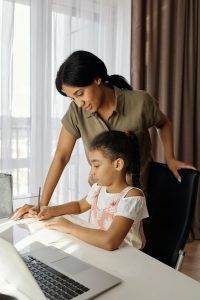Working with parents to support literacy growth with remote instruction
 If it takes a village to raise a child, it also takes a lot of cooperation to raise a reader, especially in the age of remote instruction. Research on literacy has shown that family or parent involvement improves children’s literacy performance because it fosters positive feelings about reading and therefore encourages children to read.
If it takes a village to raise a child, it also takes a lot of cooperation to raise a reader, especially in the age of remote instruction. Research on literacy has shown that family or parent involvement improves children’s literacy performance because it fosters positive feelings about reading and therefore encourages children to read.
As the COVID pandemic has raised concerns over student achievement and growth, it is critical to underscore the value of teacher-parent collaboration and their shared responsibility in helping students improve reading skills. With that in mind, here are three ways teachers and parents can support students during these unprecedented times:
Use everyday experiences to support literacy.
An infographic by The National Center on Improving Literacy suggests that one of the ways that families can support a child’s literacy progress is by turning everyday experiences into literacy learning opportunities using household items.
Does a family’s dinner-making ritual include a recipe that a child can read? How about checking the mailbox to discover whose got mail and from whom?
Teachers can support this effort by suggesting resources and activities that families can do at home.
The National Education Association offers these tips to primary and secondary grade teachers:
- Send a letter to parents in multiple languages that outlines a plan for home literacy learning
- Provide sessions to parents that highlight activities that parents can do at home
- Record lessons so that they are accessible by parents
Get books into their hands.
For students to read, they must have access to age-appropriate books. In the age of remote learning, access to a school library is no longer a given so parents, teachers and schools must all share the responsibility of restoring access to reading material. For teachers this may mean working with the school administration to create a system where students can reserve library books in advance and then pick them up during established times. Parents may play a role by ensuring students have transportation to and from book pickup locations or help students access additional reading material from public libraries that may operate under similar safety protocols.
Make reading routines.
Ensuring that a child reads every day contributes significantly toward improving their reading abilities and both parents and teachers play a role in ensuring this happens. Jori Krulder, a high school English teacher with more than 20 years of experience, writes in her Edutopia article that translating classroom routines to remote learning was daunting at first. However, Krulder eventually translated her 10-15-minute classroom choice reading ritual into a remote experience.
Every class, Krulder would take roll by calling on students to respond with the name of the book they are reading and the page number they are on. By keeping track of their progress, she was able to identity students who lagged behind and follow up with them individually to recommend alternative books that may be of more interest. Her meticulous tracking of student reading history and preferences informed her personalized book recommendations.
Parents of primary and secondary grade students can also implement reading routines at home such as reading before bedtime or other times that work with a family’s routine. Also, parents can support reading at home by creating a physical reading space that is cozy, inviting and has easy access to books.
Furthering training for educators
Elementary, middle or secondary school teachers with leadership as a career goal, can pursue a Master of Education (MEd) in Educational Leadership at William Woods University. Among the courses that students take in this program is EDU 580 – Educational Technology. This course is designed to help educators understand and leverage technology in today’s learning environments and advance student achievement across all subjects including literacy.
For more details about this program, visit: https://www.williamwoods.edu/academics/graduate/education_graduate/master_of_education_in_educational_leadership.html

